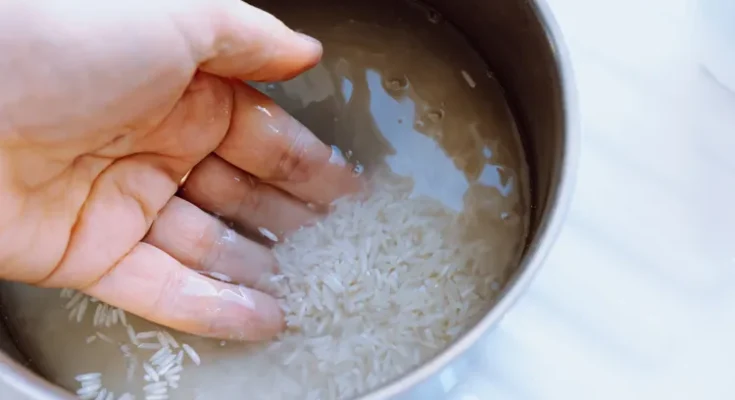Find out whether this simple kitchen byproduct can actually give your plants a boost.
You may have seen viral videos of people pouring rice water onto their plants, claiming that it will give your greenery a boost. It may seem far-fetched that the cloudy liquid left over after you wash raw rice before cooking it could be beneficial. But according to studies, that water contains starches, nutrients, and minerals leached from rice, including nitrogen, phosphorus, potassium, zinc, and B vitamins, all of which are good for plants. Here’s what to know before you try using rice water on your plants.
Washed Rice Water as a Fertilizer
It’s common practice to rinse rice before cooking it to remove excess starch, which can cause the cooked rice to be gummy and sticky, and to remove debris, dust, and dirt that gets on the rice during processing and packaging. Many cooks just discard that water, but reusing it as plant fertilizer has been a tradition in Japanese agriculture for centuries. And fermented rice water has been used to grow hydroponic tomatoes in China.
Several studies have demonstrated that washed rice water acts as a mild fertilizer when used alone, promoting plant growth in the short term. Brown rice, which retains its bran layer, contains more nutrients and minerals than white rice, meaning the water used to rinse brown rice has more nutrients for plants.
Rice water also can improve long-term plant health by increasing the growth of beneficial microorganisms that break down nutrients and make them available to plants. In other words, consistent use of rinsed rice water increases soil fertility.
Supercharge Rice Water by Fermenting It
The secret to unlocking the most nutritional power in washed rice water is to ferment it.1 Fermented rice water contains more nutrients and beneficial microorganisms that enhance soil and plant health. Fermented rice water is a significantly better fertilizer than water that comes directly from the rice.
Fermenting rice water for nine days increases its levels of potassium, calcium, magnesium, copper, and boron by up to 204%, according to one study.2 The microbial population reached its peak at three days of fermentation. Fermented rice water, derived from both white and brown rice, has been found to potentially enhance plant growth and improve overall soil health due to its rich mixture of plant nutrients and microbial content.
And it’s super simple to ferment rice water at home following these steps:
Step 1: Collect the Rice Water
After rinsing the rice, save that cloudy water.
Step 2: Pour the Rice Water into a Jar
Pour the rice water into a clean glass jar, leaving space at the top. Cover the jar loosely with a cloth that will allow gases to escape.
Step 3: Wait for Fermentation to Occur
Let the jar sit at room temperature, out of direct sunlight, for three to nine days. The ideal fermentation time varies based on temperature, but when the liquid starts to smell slightly sour, the rice water is considered fermented.
Step 4: Dilute and Use on Plants
Fermented rice water is potent. Dilute it 1:1 with water before using it on plants. You can apply it every two to four weeks.
Benefits of Reusing Rice Water
The most significant value of reusing rice water for your plants may be that it saves freshwater. One study3 estimates global rice consumption at 510 million tons, which translates to approximately 135 billion gallons of water used in rice rinsing. That’s equivalent to 4.5 million residential swimming pools full of water. Reusing rice water by pouring it on plants instead of dumping it down the drain could have a substantial impact on the freshwater supply.
“Reusing washed rice water promotes better water governance, particularly in the face of increased fresh water needs due to population expansion and climate change,” researchers wrote. “Proper utilization of WRW could reduce chemical fertilizer use and prevent both surface and groundwater contamination and environmental pollution.”
So be kind to the planet and your plants. Save your rice water and pour it on your garden.



